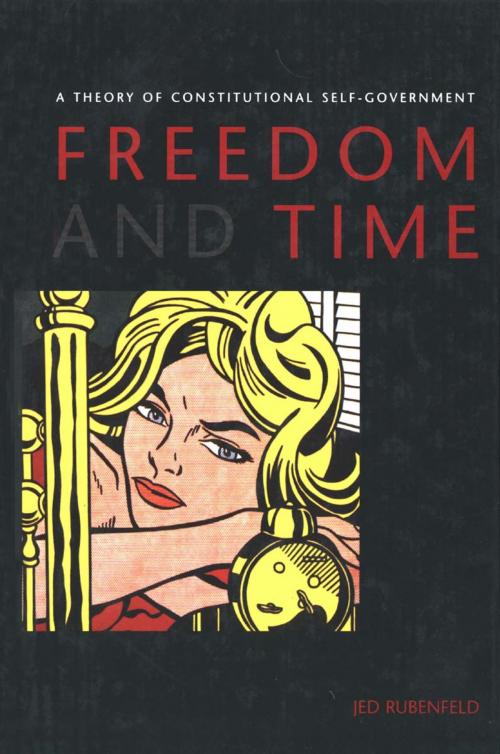Freedom and Time
A Theory of Constitutional Self-Government
Nonfiction, Religion & Spirituality, Philosophy, Political| Author: | Professor Jed Rubenfeld | ISBN: | 9780300129427 |
| Publisher: | Yale University Press | Publication: | October 1, 2008 |
| Imprint: | Yale University Press | Language: | English |
| Author: | Professor Jed Rubenfeld |
| ISBN: | 9780300129427 |
| Publisher: | Yale University Press |
| Publication: | October 1, 2008 |
| Imprint: | Yale University Press |
| Language: | English |
Should we try to live in the present”? Such is the imperative of modernity, Jed Rubenfeld writes in this important and original work of political theory. Since Jefferson proclaimed that the earth belongs to the living”-since Freud announced that mental health requires people to get free of their past”-since Nietzsche declared that the happy man is the man who leaps” into the moment-modernity has directed its inhabitants to live in the present, as if there alone could they find happiness, authenticity, and above all freedom.
But this imperative, Rubenfeld argues, rests on a profoundly inadequate, deforming picture of the relationship between freedom and time. Instead, Rubenfeld suggests, human freedom-human being itself--necessarily extends into both past and future; self-government consists of giving our lives meaning and purpose over time. From this conception of self-government, Rubenfeld derives a new theory of constitutional law’s place in democracy. Democracy, he writes, is not a matter of governance by the present will of the people” it is a matter of a nation’s laying down and living up to enduring political and legal commitments. Constitutionalism is not counter to democracy, as many believe, or a pre-condition of democracy; it is or should be democracy itself--over time. On this basis, Rubenfeld offers a new understanding of constitutional interpretation and of the fundamental right of privacy.
But this imperative, Rubenfeld argues, rests on a profoundly inadequate, deforming picture of the relationship between freedom and time. Instead, Rubenfeld suggests, human freedom-human being itself--necessarily extends into both past and future; self-government consists of giving our lives meaning and purpose over time. From this conception of self-government, Rubenfeld derives a new theory of constitutional law’s place in democracy. Democracy, he writes, is not a matter of governance by the present will of the people” it is a matter of a nation’s laying down and living up to enduring political and legal commitments. Constitutionalism is not counter to democracy, as many believe, or a pre-condition of democracy; it is or should be democracy itself--over time. On this basis, Rubenfeld offers a new understanding of constitutional interpretation and of the fundamental right of privacy.
Should we try to live in the present”? Such is the imperative of modernity, Jed Rubenfeld writes in this important and original work of political theory. Since Jefferson proclaimed that the earth belongs to the living”-since Freud announced that mental health requires people to get free of their past”-since Nietzsche declared that the happy man is the man who leaps” into the moment-modernity has directed its inhabitants to live in the present, as if there alone could they find happiness, authenticity, and above all freedom.
But this imperative, Rubenfeld argues, rests on a profoundly inadequate, deforming picture of the relationship between freedom and time. Instead, Rubenfeld suggests, human freedom-human being itself--necessarily extends into both past and future; self-government consists of giving our lives meaning and purpose over time. From this conception of self-government, Rubenfeld derives a new theory of constitutional law’s place in democracy. Democracy, he writes, is not a matter of governance by the present will of the people” it is a matter of a nation’s laying down and living up to enduring political and legal commitments. Constitutionalism is not counter to democracy, as many believe, or a pre-condition of democracy; it is or should be democracy itself--over time. On this basis, Rubenfeld offers a new understanding of constitutional interpretation and of the fundamental right of privacy.
But this imperative, Rubenfeld argues, rests on a profoundly inadequate, deforming picture of the relationship between freedom and time. Instead, Rubenfeld suggests, human freedom-human being itself--necessarily extends into both past and future; self-government consists of giving our lives meaning and purpose over time. From this conception of self-government, Rubenfeld derives a new theory of constitutional law’s place in democracy. Democracy, he writes, is not a matter of governance by the present will of the people” it is a matter of a nation’s laying down and living up to enduring political and legal commitments. Constitutionalism is not counter to democracy, as many believe, or a pre-condition of democracy; it is or should be democracy itself--over time. On this basis, Rubenfeld offers a new understanding of constitutional interpretation and of the fundamental right of privacy.















